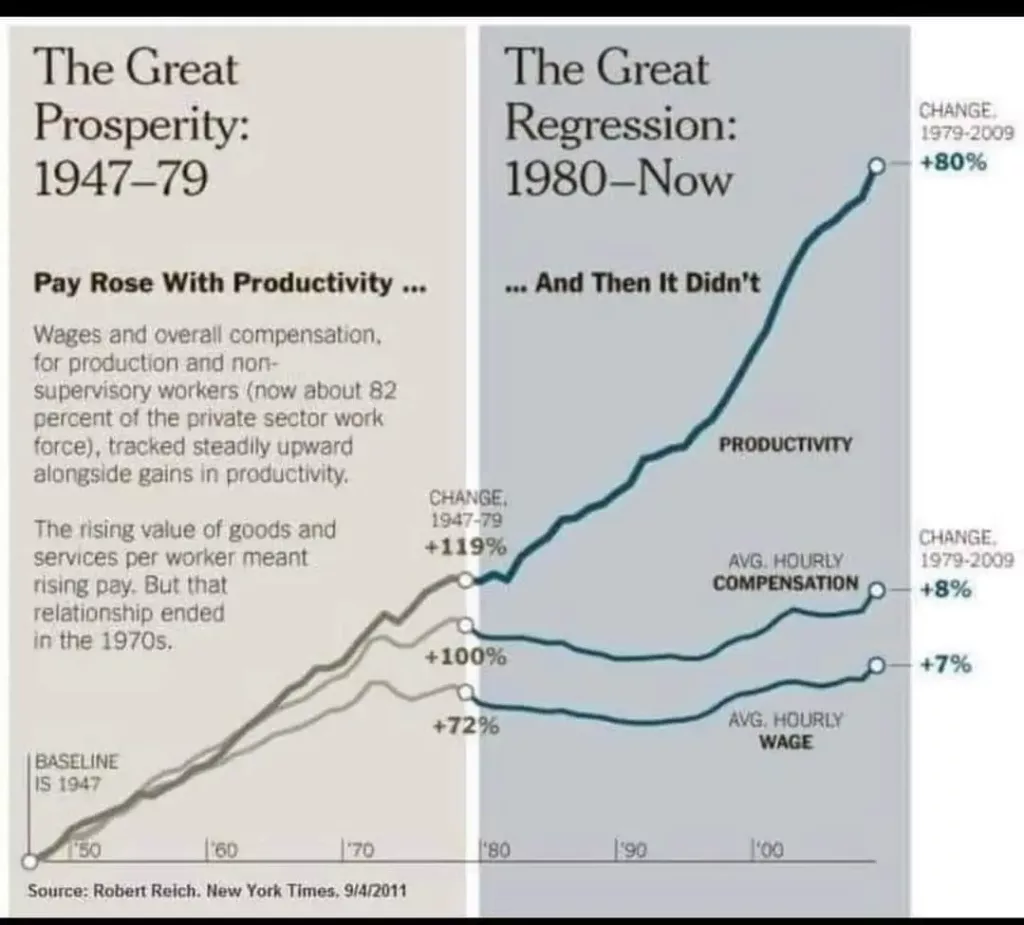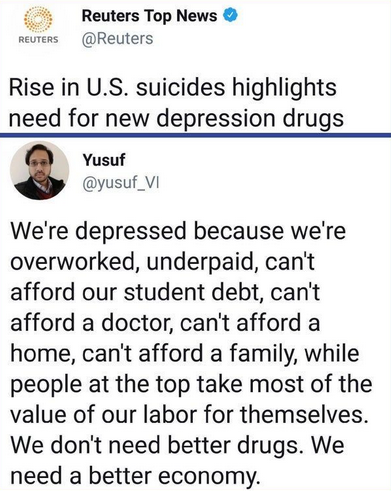I recently had a breakdown and ended up going to therapy. It was a strange experience, one that left me wondering if it was really trying to help, or had an ulterior motive. I’ve had time to digest it, and while I don’t think there’s any strange conspiracy going on, it has left me wondering about the state of our society.
A Passing Quote
Some time ago I was watching a video by Jacob Geller, where he attempts to fix his brain with automated therapy. It’s a slightly tongue-in-cheek, yet informative video, where he uses and tests a bunch of automated therapy apps and leaves his thoughts on each. Near the end of the video he quotes part of a video game script, and one line in particular stood out to me.
Would you tell them to stop coming to therapy because what they should really be doing is completely changing the way our society is structured?
This sentence lingered in the back of my mind. What was the answer to this question? It bugged me that the answer didn’t seem simple. It stayed stuck in my brain, but it eventually faded. Forgotten as is the fate of many a thought.
That is, it would have been, had I not by chance started playing the game quoted in the video. But that’s jumping ahead a little. Because shortly after watching this video I found myself in the process of attempting to fix my own brain.
Fixing My Own Brain
Last year I hit a huge slump in my mental health. I found myself in a great depression and was unable to motivate myself. I stopped showing up to life in general. This also included not showing up to work, and my colleagues noticed.
As a result of this, the company sent me to talk with a psychologist to assess my mental health, a therapist to try and help me get back on track, and an occupational therapist to assess if I was fit enough to work. It was a strange experience, and something about it felt a little off.
I made an appointment with the psychologist first. Before I had even seen her in person, she asked if I wanted to go anti-depressants. This surprised me. I always thought you’d need some kind of diagnosis before you were prescribed anti-depressants. I turned them down – I didn’t want to resort to drugs before I’d tried any actual treatment. It didn’t make sense to just get high to make all my problems disappear.
I saw her in person about a week later, told her my problems, and she signed me off work. After that I would start to see the therapist. The company provided a six week course of therapy. I also saw the psychologist again a week later, to assess how I was doing.
When the second visit started she immediately started asking me if the drugs were making me feel any different. My blank, confused stares reminded her that I had refused them. I found it odd that she had assumed I had said yes to them. Do most people usually just go straight for the drugs?
The therapy progressed well. It was nice to get a load off my chest, but at one point the therapist let it slip that her job was to encourage me to get back to work. She was a good therapist though, and when she realised that it maybe wasn’t the best thing for me she enabled me to explore other options.
After the therapy was finished and I was back in work, the company sent me to an occupational therapist. Almost immediately he could see I was fit for work, but he said that he could tell that I was depressed. He started encouraging me to take the drugs, as it would make work easier to cope with.
The whole experience felt a little strange. Maybe I just had a bad experience. Maybe it’s just my paranoia messing with my head. But, for whatever reason, it felt like the whole process was giving me a clear message:
Just take the drugs and get back to work.
I felt like I was in an Aldous Huxley novel.
Eliza
I went back to work and things were normal for a while. I kept playing games and writing about them. Eventually I came across Eliza, and it provoked a strong reaction in me.
The game focuses on an app based on Eliza, one of the earliest LLMs. The app is designed to be an AI therapist, effectively automating the role of therapy.
It covers a lot of themes surrounding this app: our use of AI, the automation of jobs, the increasing reliance on therapy, happiness as conformity, rebellion as freedom. It does a good job of presenting these themes without providing a strong and opinion on them. It leaves that part for the player to figure out for themselves.
The AI would often end its sessions by prescribing what seemed to be random drugs, or a set of therapy app exercises. Most of the time the patients didn’t seem to have actually been helped, their responses ranging from just accepting that’s all they get, to begging for more help. It made me think about my own experience, where it felt like they were just pushing drugs on me.
And then right in the middle of the game was that quote that had been bugging me since I watched Jacob Geller’s video. And now I can’t get it out of my head at all now. Should I be going back to therapy? Should I write an article about it? Or should I…
Completely Change the Way Our Society is Structured?
Automated therapy is a rising industry. There are apps that can connect you to real therapists as well, a natural extension of online therapy being a necessity during the pandemic. But this isn’t just a new fad in technology. Demand for therapy is rising so much that it can’t be met. Many believe this to be a mental health crisis.
Much of this could be blamed on the pandemic. Long stretches of not being able to socialise, travel, or live a normal life. Rising conflicts between those who call the virus a hoax and those who can’t understand why people refuse to wear a mask. It’s a hotbed for mental health issues.
But, I think it’s more than that. Ever since the turn of the century, people’s quality of life has been slowly slipping away. Look up any graph against the rise in wages – inflation, house prices, wealth of billionaires. They all look the same. We now live in a world where many people can’t afford a house, can’t afford children, and consider food to be a luxury item.

This compounded with the pandemic, with the rise of extremists in the USA and elsewhere, the wars and genocides that are breaking out around the world, it’s hardly a mystery as to why people are suffering. There is another pandemic, one of mental health, and therapy cannot fix it.
Just in case that sounds like I’m criticising therapy, I’m not. Therapy is a necessary and effective treatment for many mental health issues. And to be honest, I don’t know enough about mental health care to give genuine opinions or criticisms on the field.
But when you have a radioactive factory that’s giving everyone cancer and the hospitals can’t keep up, maybe it’s time to consider shutting down the factory rather than creating apps that can administer chemotherapy automatically.
This is why it’s been bugging me for a while now. My brief experience with therapy basically felt like having drugs pushed on me so that I could get back to work. Are they quick to push the drugs because they can’t meet demand and it’s a quick and easy fix? Is this the right solution to a growing mental health crisis that is overwhelming healthcare professionals?
Or should we be completely changing the way our society is structured?





